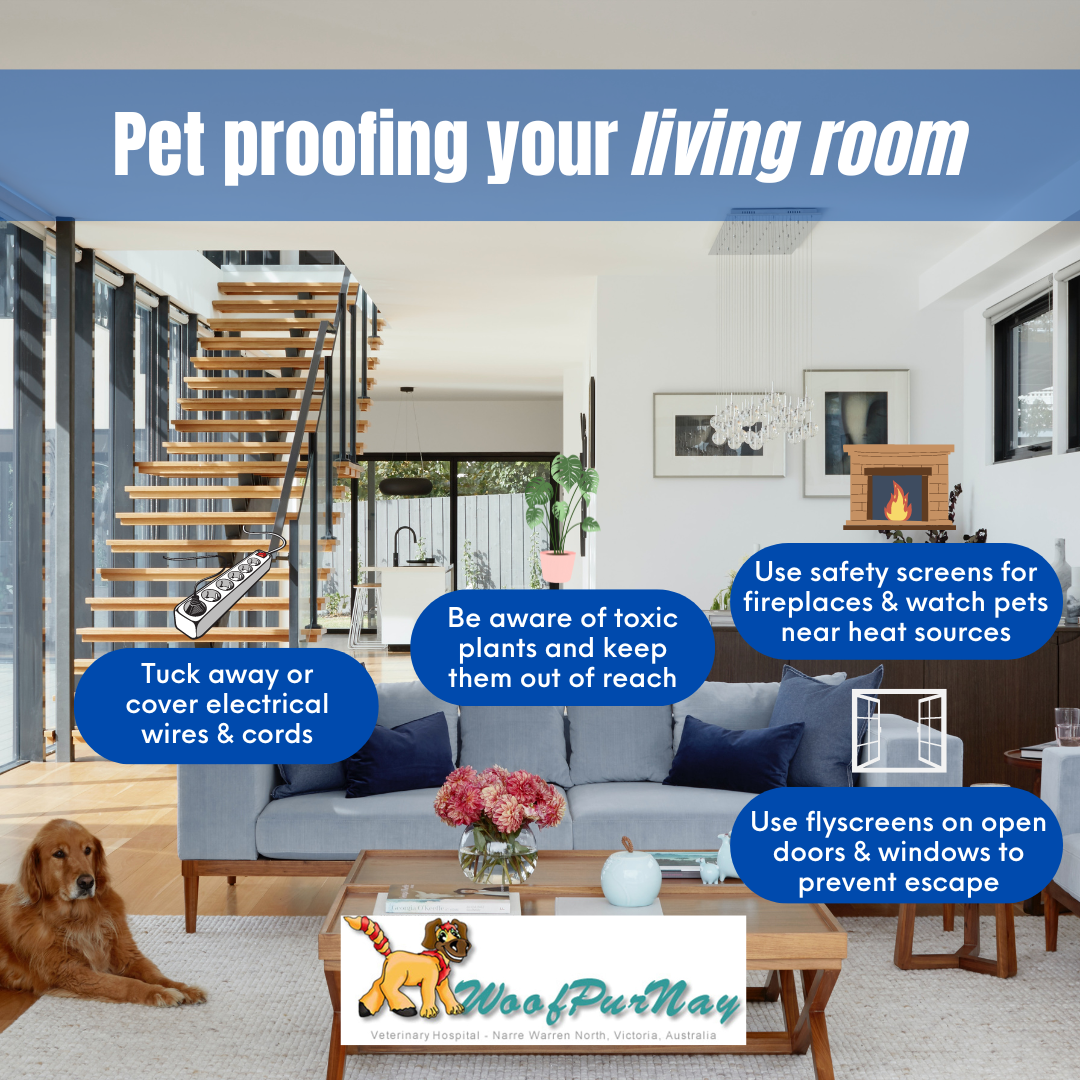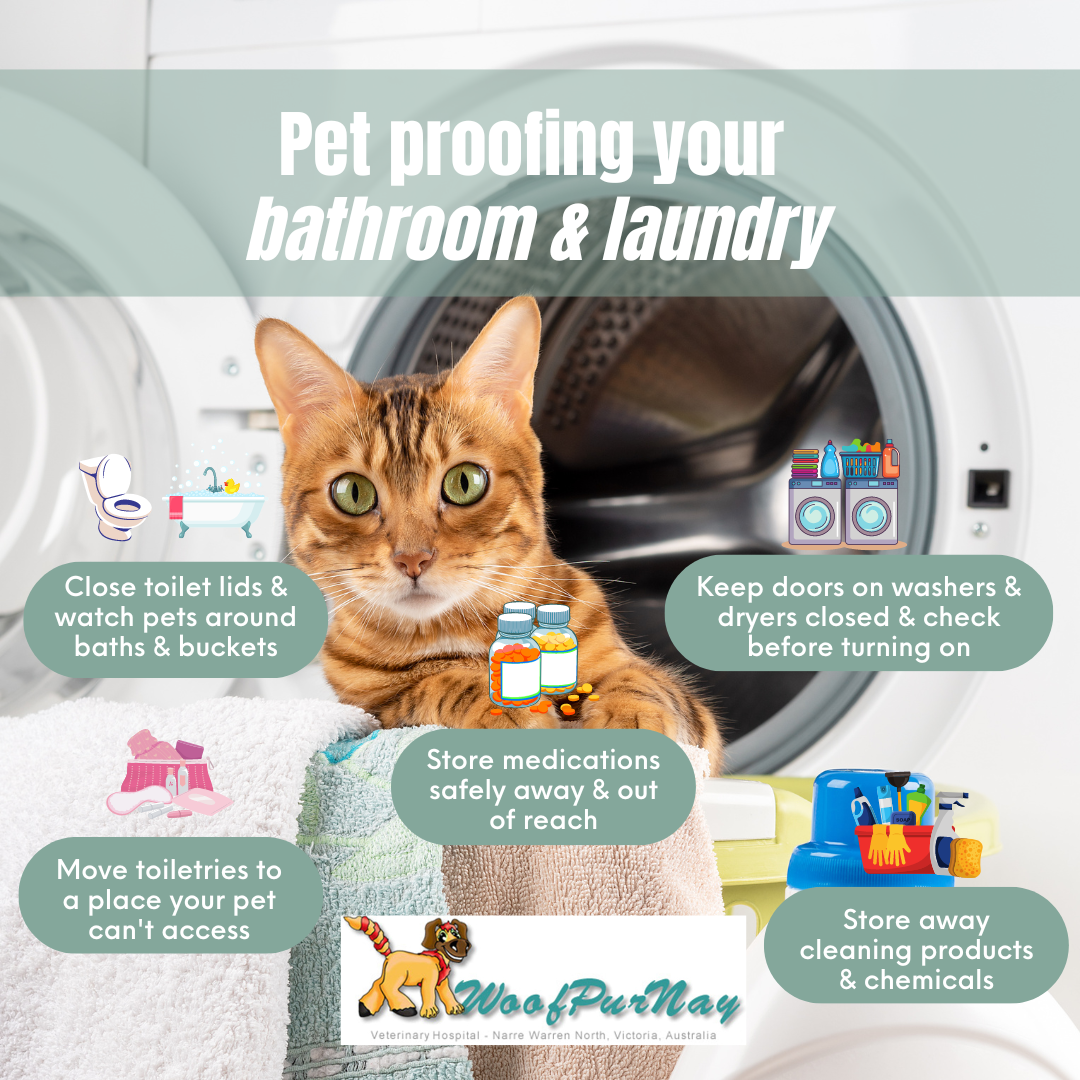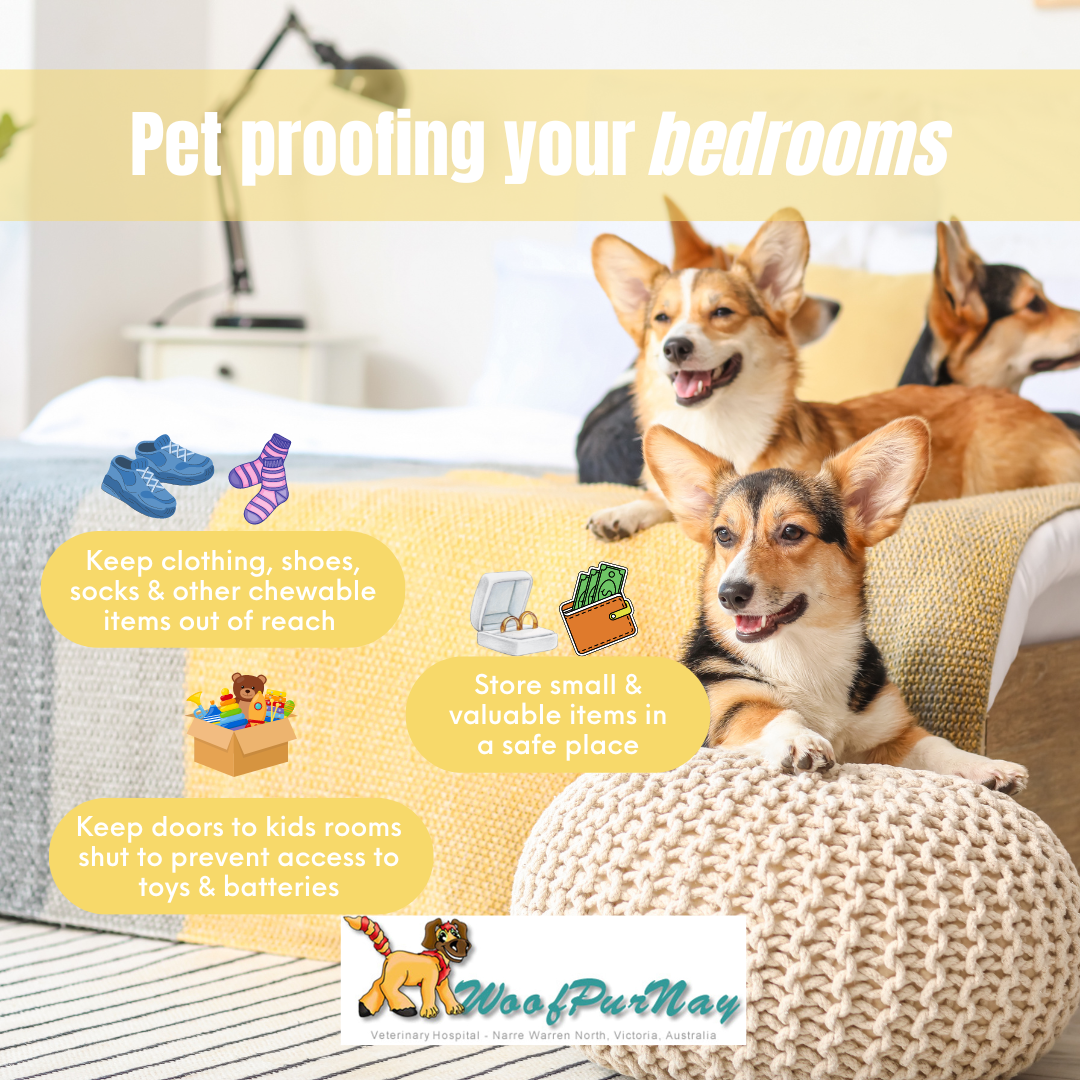As the cooler weather approaches, we tend to spend more time indoors with our pets where it is warm and comfortable. Pets are wonderful companions and can help fight off the winter blues however, there are some common hazards around the home to look out for. From the kitchen, bathroom, laundry, bedrooms and living area to the garage and backyard, we will take you through each room to look at some of the expected and not so expected hazards to look out for.
The Kitchen
Draws & cabinets: are full of fascinating smells, areas to explore and items to chew on or play with. To keep pets away you can secure these with childproof latches or place hazardous items in containers and up higher where your pet can’t reach them.
Bins: pets can be attracted to the smell and contents of your garbage. Make sure bins are covered by a lid or secured in a cupboard that can’t be accessed to prevent them sneaking in and ingesting toxic food or being harmed by sharp or chewable small objects.
Food: certain foods are toxic to pets so its important to keep these out of reach or in sealed containers. Chocolate in all forms – especially dark or cooking chocolate – can be very dangerous, even fatal for our pets. Lollies and sugar free treats that contain xylitol are toxic to pets. Other toxic items include grapes, raisons, macadamia nuts, onions, garlic, coffee and alcohol.
Dishwashing & cleaning products: dishwashing detergents, tablets and cleaning products need to be kept out of reach. Kitchen sponges also need to be replaced frequently and kept out of reach as they contain harmful cleaning chemicals, germs and bacteria.
Plastic bags and cling wrap: can cause suffocation or stomach complications so keep these out of reach and stored away.
Living room
Electrical wires & cords: loose cords and electrical gadgets can pose a serious threat to pets if they become tangled amongst, chewed on or if parts are swallowed so tuck cords away or cover them to keep them out of your pets way. If you have a problem with your pet chewing, offer them a chew toy to focus their energy on.
Poisonous plants: flowers look great around the home and in the garden but some can be toxic to your pet. Lilies are highly toxic and potentially fatal to cats. Some types are also toxic to dogs. All parts of the plant, including the pollen, flower, leaves are poisonous so make sure they are well out of reach. Other plants that can also be dangerous if eaten by your pet include azaleas, tulips, daffodils and carnations.
Fireplaces, heaters & candles: place safety screens in front of fireplaces and always keep an eye on your pet near heaters and fires as they can fall asleep or lie too close which can lead to dry skin or even worse, burns. Make sure candles are out of reach to prevent curious pets getting burnt or fires started from accidental knock overs.
Open doors & windows: great for letting in fresh air, but not so good if they tempt your pets out into a world of cars and other dangers. If your pets can get out be sure it is into a safe, secure backyard. Otherwise fly screens are a great alternative.
Bathroom and laundry
Toilets & bathtubs: the bathroom and laundry commonly contain bodies of water in sinks, bathtubs, buckets etc. so keeps pets away or be mindful of them when using water. Toilets are another hazard, especially if you use chemical cleaners so close the toilet lid to prevent your pet from drinking the water or falling in.
Medications: expect that your curious pet may find whatever you drop and never leave open medication uncapped or unsealed. Pet medications may also smell tempting to your furry friend. It is important to keep all medications stored away and out of reach.
Toiletries: everyday items such as soaps, razors, dental floss, shampoos etc can pose a threat to your pet if they chew on or ingest them so move them to a location that your pet can’t reach.
Cleaning products: almost all cleaning products, even natural ones contain chemicals that may be harmful to pets. Be sure to keep all cleaners and chemicals out of your pet’s way, both during use and in storage.
Washers & dryers: can be a tempting warm spot for a nap, especially for cats so keep doors on appliances closed and always check inside before turning them on.
Bedrooms
Clothing & shoes: your pet will be drawn to your bedroom as it contains your familiar scent. Clothing, shoes, socks and other chewable items should be out of reach for the safety of your pet and for your own benefit.
Small & valuable items: keep jewellery, hair clips, pins and bands tucked away and out of reach as these can cause stomach upsets, choking and blockages in your pets stomach if chewed on or swallowed.
Toys & batteries: kids rooms can be filled with lots of colourful and interesting toys and battery powered gadgets which can pose a serious threat if chewed on or if parts are swallowed. In many cases, it is best to keep doors to kids rooms shut so your pet cannot access them.
Garage & backyard
Fertilisers & insecticides: they may keep our lawns and plants healthy, but their ingredients can be dangerous if your pet ingests them. Always label and store them out of reach and call us immediately if your pet has swallowed anything poisonous.
Snail & slug bait: is highly attractive for dogs and cats and ingestion even in small quantities can be fatal. Even those advertised as “pet safe” can still cause severe gastrointestinal signs and red blood cell damage. So reconsider whether these are absolutely necessary in your garden.
Pools and spas: chemicals are a problem if pets drink from pools or spas, however there is also the danger of them falling in and not being about to get out. Check fencing around these areas is secure enough to prevent your pet from getting in.
Secure fences and gates: make sure your backyard is secure and there is no way that your pet can escape by digging under, wriggling through or jumping over a gate or fence.
What to do if your pet eats something toxic
If you suspect your pet has swallowed something toxic or is displaying signs of poisoning, contact your vet immediately.
It’s also a good idea to be prepared and have local emergency numbers on hand and familiarise yourself with any special emergency hours over long weekends and public holidays.






